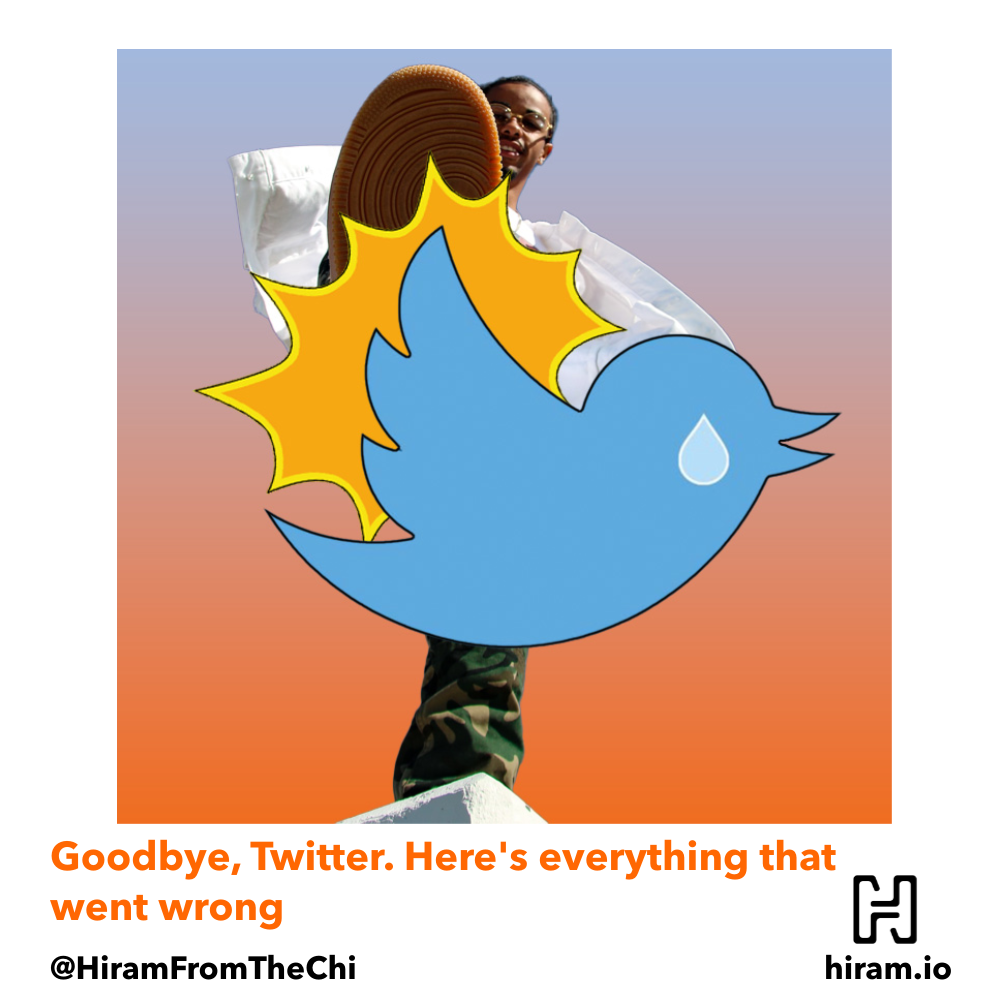2016: Left Facebook.
2018: Left Instagram.
2021: Stumbled across the no-code community on Twitter.
2023: Goodbye, Twitter.
✅ Biometrics and ID stored forever who-knows-where
✅ Continued data mining and exploitation
✅ Total surveillance state
? The enshittification continues. Gotta love it.
I'm no longer bullish on Twitter, or X, or Xitter, or whatever you wanna call it. For a period of time after it became private, I was actually optimistic. Open sourcing the algorithm? Awesome. Increasing transparency by surfacing when you're shadow banned? Good. Paid social? That's fine.
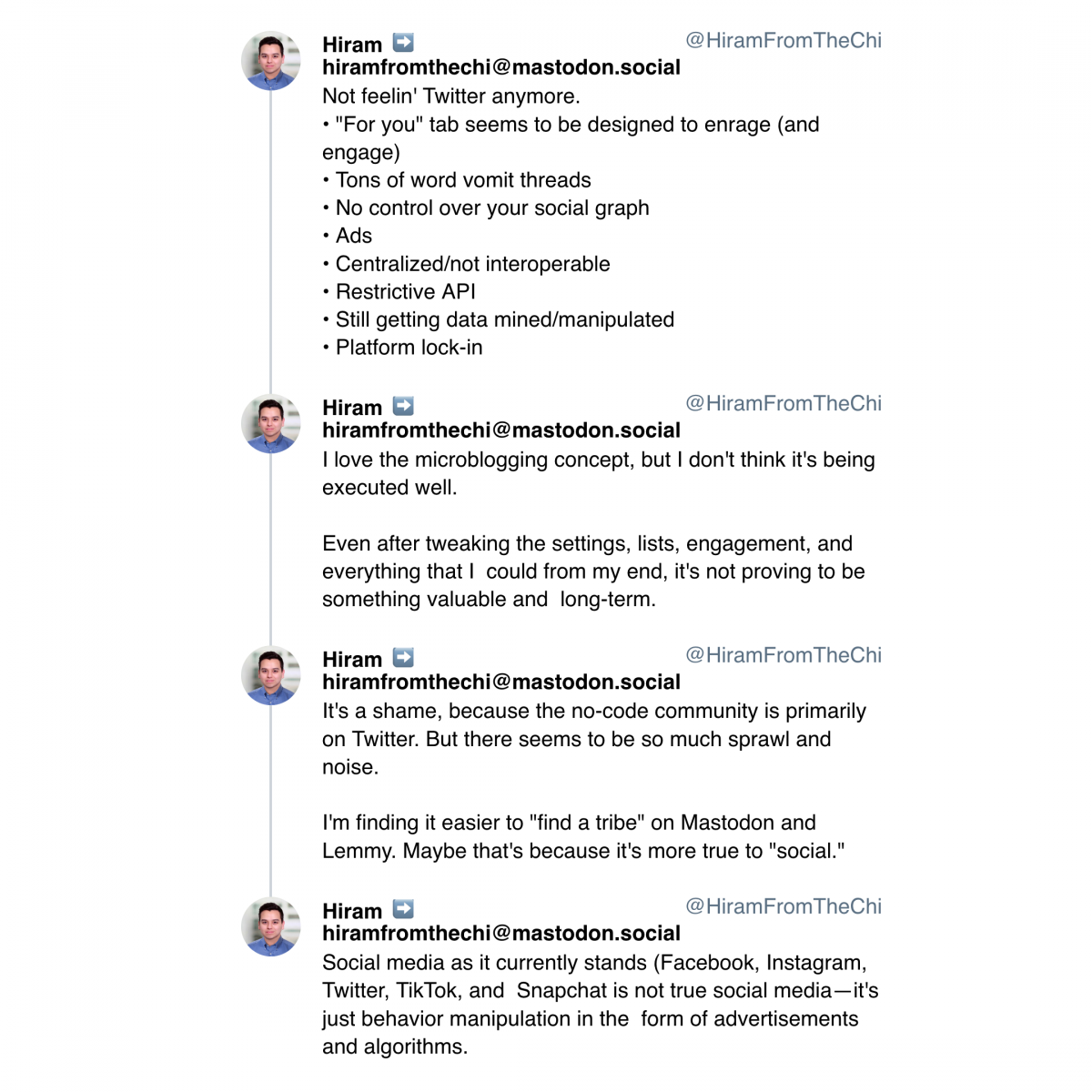
If you're providing a service, I see nothing wrong with asking for credit card details. (Although I do have a problem with double dipping on revenue by paying for the service and still being the product by getting data mined, exploited, and having no privacy.)
I don't even mind treating a $44 billion acquisition like an indie hacker side hustle and experimenting with it.
I don't know what it's turning into, but if it truly is a "WeChat of the West," it's not something I'm interested in participating in. And I don't wanna have a hand in building it.
If it truly becomes this, it means that Twitter/X would really become an identity platform.
And us being on this platform gives it value. Gives it validity.
I wonder every single day if it makes sense to leave the platforms in protest, or stay in the belly of the beast and raise awareness from within.
I see value in both, but I don't think there's a way to know which is the "correct" or "best" approach until you have hindsight. (Although I did have this insightful conversation with a stranger recently.)
Either way, it's clear that we don't matter for anything other than exploitation. The business model doesn't allow for anything else, really.
And honestly, it's good to limit social media in general anyways, even if it means less building in public, brand building, etc. Those things aren't more important than health—especially mental health.
When you are on social, those interactions should be meaningful and with a purpose.
With that said, the enshittification of Twitter/X has simply become too much to take.
The "For you" tab strategy: enrage to engage
This isn't unique to Twitter/X, but it still doesn't make it right. Facebook and YouTube have been doing this for a long time now, and even though most—if not all—mainstream social media platforms do this, it still doesn't make it right.
On the surface, the concept of this tab seems nice and harmless in nature; explore new people and content to follow that you may be interested in. Cool.
But look beyond the surface, and you'll notice that this tab is filled with:
- Repetitive content
- Content designed to test and trigger you
It's an effective strategy, so I get it. But it's not good for us. It's not human-centric. It's not empathetic. And we shouldn't support it.
It's just another example of these platforms never having our best interests in mind. And they can't—the business model simply doesn't allow it.
Vomit threads continue
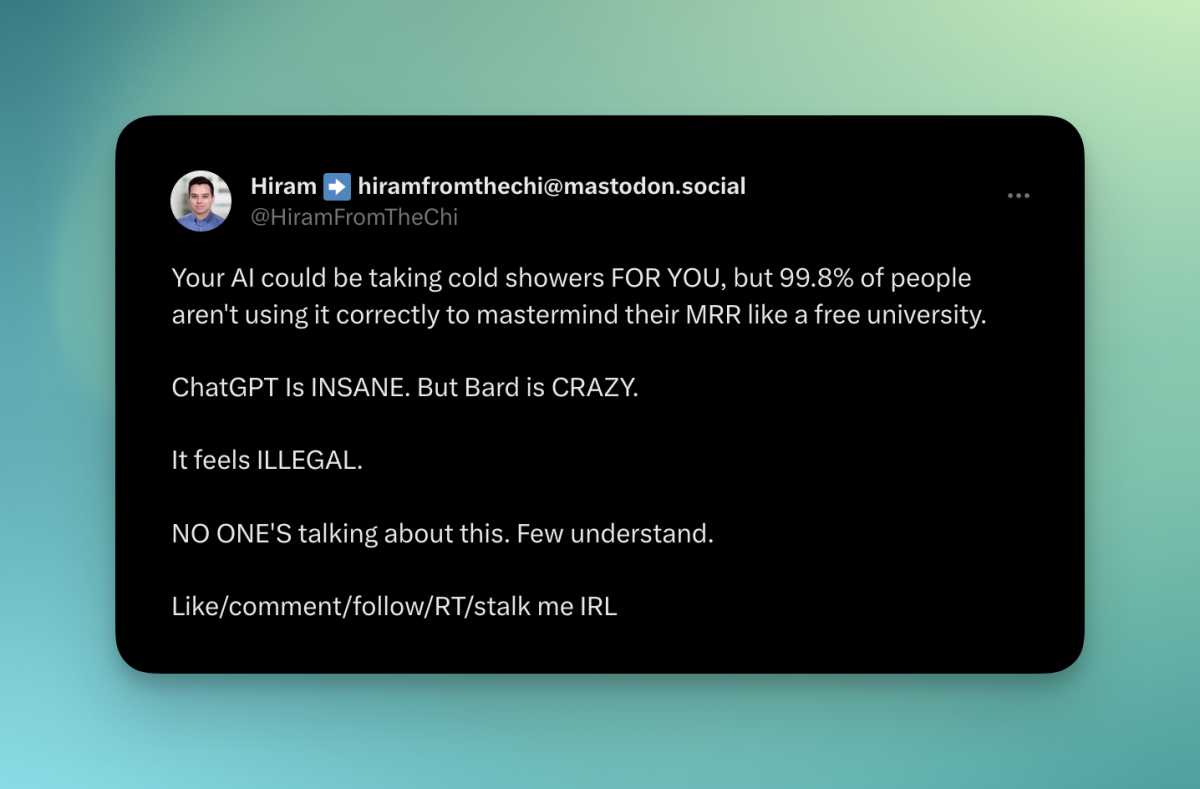
Even if you use Twitter for a very specific purpose (like memes, for example), chances are you've seen these threads, filled with nothing but word vomit. Word diarrhea. Call it what you want, but they're not really saying anything. And they're often not even original, either.
They're often generated by Twitter growth tools that tons of people use, so everything just ends up getting recycled. So there ends up being no original content.
No control over your social graph
This is something I didn't realize was so important. I never thought much of it, but once I started reading and thinking about the importance of controlling your social graph, it made more sense.
A deep dive into the importance of your social graph is beyond the scope of this piece, but, in short, you should be in control of:
- The content you consume
- Your following
- Your followers
- Showing and hiding your social graph
Fediverse platforms like Mastodon, Lemmy, Pixelfed, etc. allow for all of this. On Twitter/X, you have no control over any aspect of your social graph.
Ads
The modern internet is a pain to use, and ads are the primary reason for that. Need I say more?
You might be thinking: "Well hey, Hiram, that's not fair—Twitter's gotta make money somehow. Why don't you pay for premium instead?
"Don't get me wrong, I'm all for paid social. What I'm not all for is double dipping. Charging for a service is a good thing—it theoretically creates a sustainable business model that allows the platform or service to continue existing. Cool.
But the way Twitter's doing it isn't eliminating all the data mining and harvesting. It's not getting rid of everything they know about you. It doesn't stop them from continuing to build that profile on you to serve you ads and content to manipulate your behavior and sell you people, concepts, places, and things. This means that they're double (or triple) dipping on you instead.
Paid social media makes sense—as long as you then quit all the invasive privacy practices. If you're paying cash money every month, there should no more data mining, harvesting, and everything else that comes with that exploitative business model.
This was a critical mistake in the early days of the internet, and we're feeling the consequences decades later because of it.
Closed source, centralized, and not interoperable
Short story: I recently spun up an account on Lemmy, an open source and distributed version of Reddit. I created an account on the lemmy.world instance specifically. A few weeks later, the people who run that Lemmy instance announced that they would be defederating from piracy communities.
The communities didn't get blocked on lemmy.world, it just meant that you wouldn't be able to see their content if you were logged into the lemmy.world instance. Nevertheless, it was a controversial decision.
But here's the thing—if you wanna see piracy content in your feed, and the instance that your account is on doesn't allow it (like lemmy.world), then you can easily pack up your stuff and migrate to another instance that does allow it.
And that's a beautiful thing.
It's the fediverse working as intended. No single entity owns the platform. You're not forever-bound by their rules and enshittification practices.
On Twitter, and all other centralized/monopolized social media platforms, you have no choice.
The fediverse is true freedom.
Restrictive and expensive API
Speaking of freedom, Twitter's API is anything but free. And it's not free as in beer, or even free as in freedom. It's not free no matter how you slice it.
Such a restrictive API is related to the interoperability that Twitter doesn't have. With a virtually nonexistent API, third-party clients became obsolete.
Platforms often do this because they want you to use the platform natively. These platforms are designed to keep you engaged at all costs. Using a nicer, cleaner UI and having a nicer experience doesn't allow the platform to harvest your data as much, since you're interacting with it in a different capacity.
This is a problem for a huge number of reasons. (See the Reddit API debacle.)
Personally, this broke my tweet scheduler, because they weren't able to afford Twitter's tiny $42,000/month price tag.
This threw off my content, because I was no longer able to autoschedule posts. You see, with my content scheduler, I could write 10 posts at once and autoschedule them, which meant that they'd be placed into a queue that would publish the posts at predetermined times.
Basically, you add to the queue, and the content in that queue gets published based on the rules you set (type of content, time of day, labels/tags, etc.). It's a system that I spent quite a bit of time creating and optimizing.
Now, that entire system is useless, and content is a mess.
You own nothing
We never really owned anything on these platforms. I learned that long time ago, and reminded feverishly again when Professor David Carroll (unsuccessfully) tried to get his data back from Facebook.
But hijacking the @x and @music handles from individuals is cold, and not a platform I wanna be a part of.
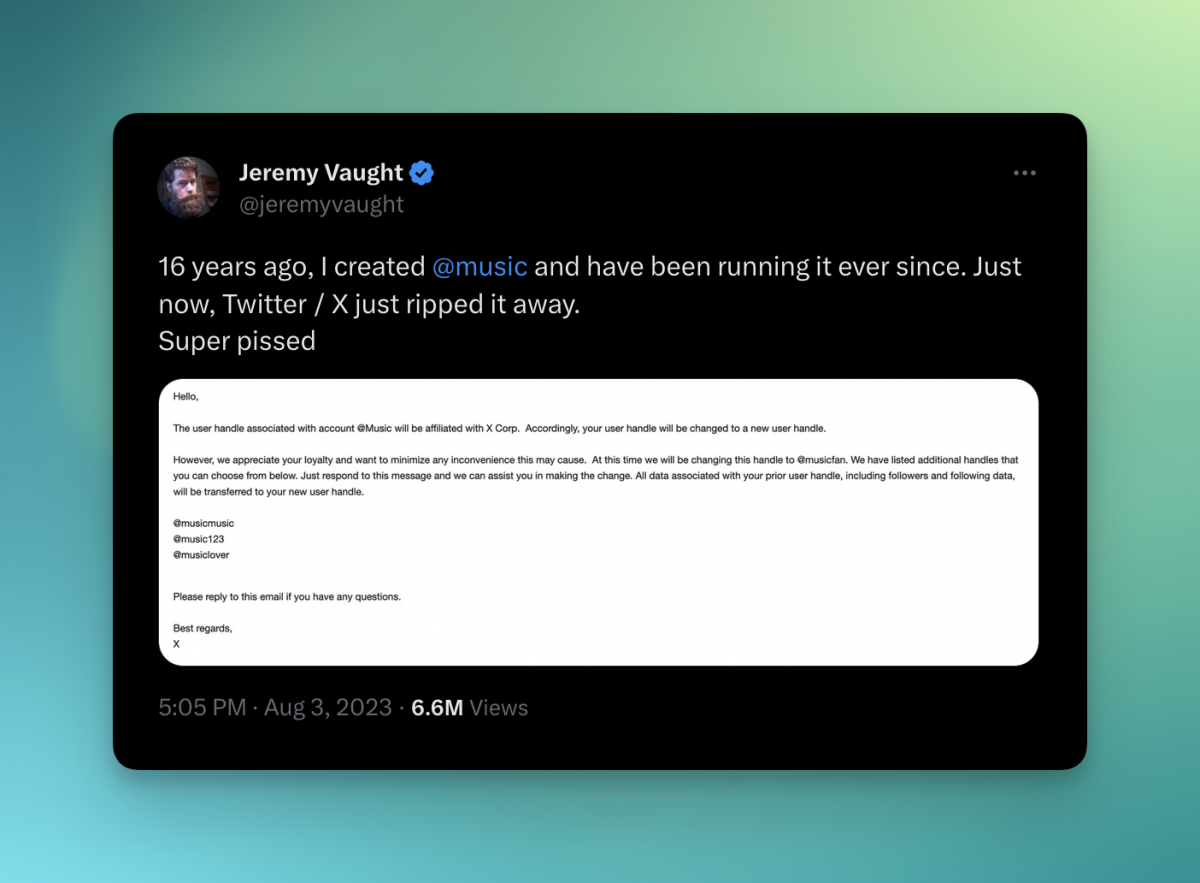
It's a great reminder that you own absolutely nothing here, and you—quite literally—don't matter. The only value is what you provide to the platform, and the platform gives you nothing in return.
Now, here's the important part: nuance.
Is it wrong to hijack the handles like that? I think most people would say yes. But here's the thing—it's in Twitter's terms of service. Which, by the way, you agreed to. We all did.
Even though we really didn't, because we didn't actually read the terms of service and privacy policy. We just wanted a way to connect with our friends, family members, watch videos, memes, read the news, and stay informed. We didn't actually "agree" to all the privacy invasions. But this is a conversation for another time.

Oh and by the way, the terms of service can change at any moment's notice, without warning to you. So keep on building this platform for nothing in return, but be prepared for the consequences.
Anti-free speech and anti-net neutrality: undemocratic principles
A report by The Washington Post found that Twitter/X started throttling links to, "the New York Times, Facebook and other sites Musk commonly attacks."
Other Twitter enshittification strategies
- Changing DM settings so only verified users can message you
- Limiting the number of tweets you can see
- Disabling the "block" functionality
- Identity verification requiring government ID and selfie, storing your biometrics and other info
- Paid engagement and lock-in disguised as creator revenue sharing
- The return of Twitter shadowbanning
- Using your posts for AI training
- Forcing clickbaity ads in your feed
- Removing headlines
- Removing the account origin
- Removing the ability to block the ad
- Removing the ability to report the ad
As I once tweeted: I don't "like" that it got this bad, but I do "like" that the worse things get, the more we can collectively organize to pressure reform and fix these things.
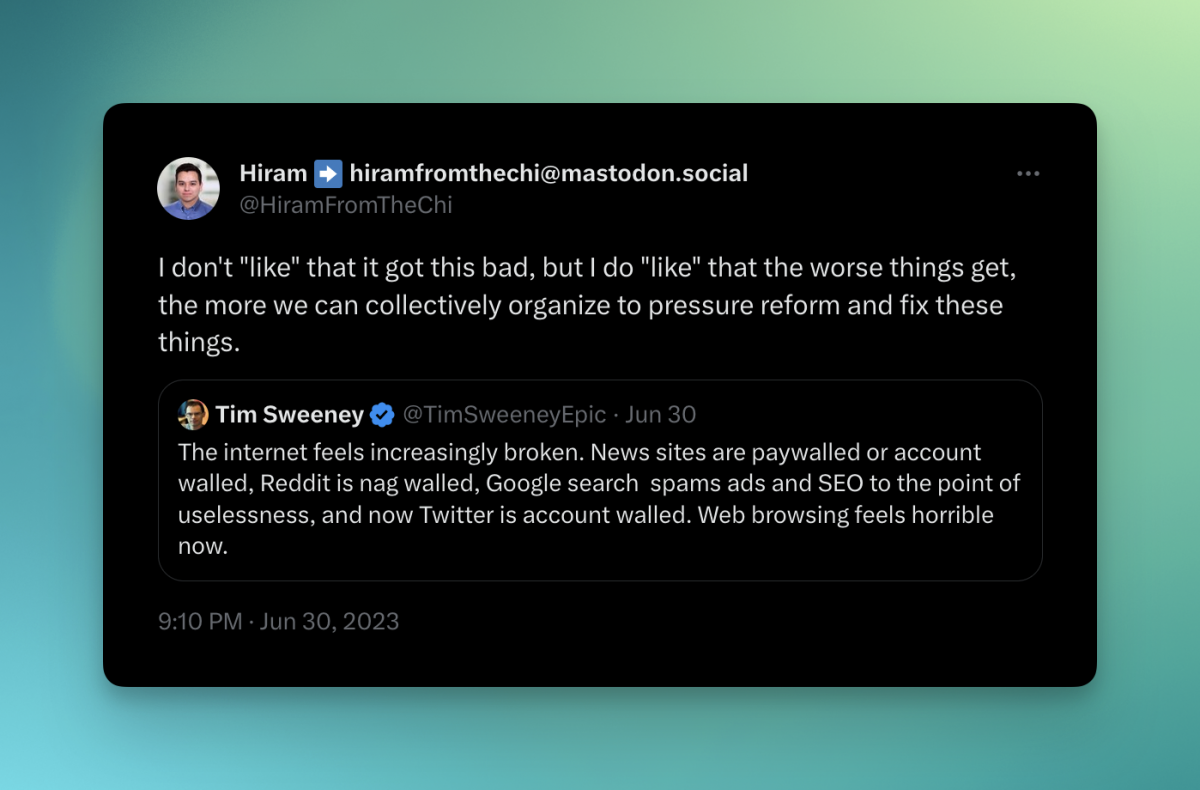
goodbye-twitter-everything-that-went-wrong
See you in the fediverse.
- Web: hiram.io
- Rising Tide (blog): hiram.io/blog
- LinkedIn: @hiramfromthechi
- Twitter/X: @hiramfromthechi
- Medium: @hiramfromthechi
- Mastodon: @hiramfromthechi@mastodon.social

